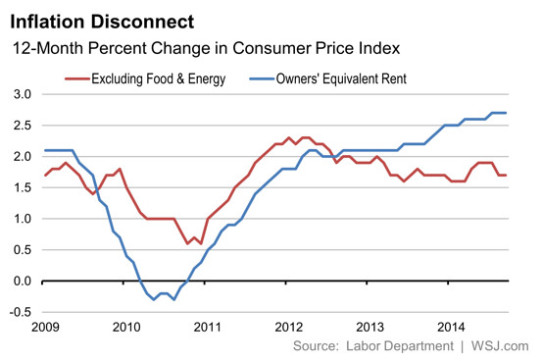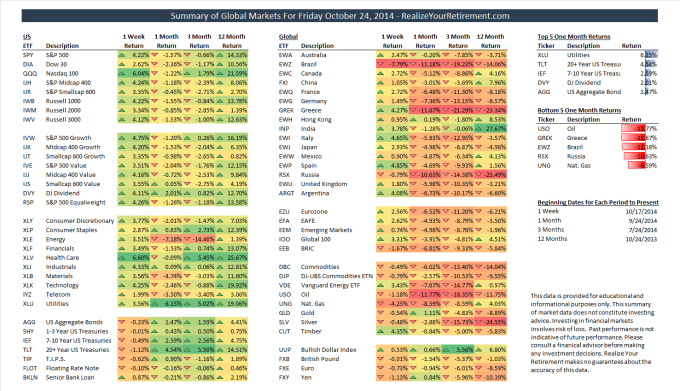Financial News Friday – October 24, 2014
Why Rising Rents Haven’t Pumped Up Inflation (WSJ)
The Wall Street Journal reports that despite the dramatic expansion of the money supply through recent stimulus policies, at the moment, economists may be most concerned with disinflation. Despite increases in the price of domestic housing, goods and services, a strong dollar has caused goods from overseas to drop in price, thereby lowering inflation.
While this is good in the short term for the consumer, it must be watched, as moving from disinflation (slightly lowered inflation) to deflation is damaging to an economy. It’s potentially damaging because it causes lenders to sit on their cash instead of lending it out. This is a problem that we do not want to exacerbate further, as many banks already have large reserves of cash that they are not lending out to consumers and businesses.
Fed Official: Big Banks Should Clean Up Their Acts (CNN Money)
William Dudley, President of the New York Federal Reserve Bank, has proposed several changes to bankers’ compensation to help curb the banking industry’s excessive risk-taking culture. To do so, Dudley proposes that bonuses paid to bankers would be locked up and only paid in full after 10 years. Fines and major losses to the firm would first be deducted from the deferred bonus account.
This proposal could encourage whistleblowers, whose personal bonuses would be on the line, to report ethical violations within the company.
New Rules for IRA Rollovers Coming (LifeHealthPro, FA Mag)
Brokers at the big financial firms may soon be held to a higher standard when rolling over accounts from 401(k)s. Over the years there have been numerous complaints about brokers recommending an investor rollover their entire 401(k) into unsuitable investments (e.g. rolling over an entire 401(k) into an unsuitable annuity or universal life insurance products.)
Currently, brokers are held to the suitability standard (required to only sell products that could potentially fit your situation, but may not be in your best interest), but soon may be held to the higher fiduciary standard (required to act in your best interest) during 401(k) rollovers (but only during 401(k) rollovers).
SEC Rejects Non-Transparent ETFs in Setback for Industry (Bloomberg)
Firms such as T. Rowe Price, Goldman Sachs, Eaton Vance, Blackrock, Guggenheim, and Precidian have all sought to produce create non-transparent active ETFs that bypass the daily reporting requirements for the underlying investments in the fund. Because ETFs are required to report the investments in the fund on a daily basis, others could easily copycat the ideas of the investment manager in a timely manner. Hedge funds and private funds are only required to publicly report their holdings on a quarterly basis, thereby limiting the ability of others to copy the fund’s investments as soon as the fund invests in a security.
The SEC has denied these preliminary requests on the grounds that non-transparent ETFs could undermine confidence in the ETF market. Non-transparent ETFs could result in higher price spreads over the value of the underlying assets due to the uncertainty of the holdings. Precidian’s CEO, however, believes that non-transparent ETFs could be approved once the SEC has its concerns addressed.
Why High-Frequency Trading Is So Hard to Regulate (NY Times)
Recently, the SEC has taken steps to punish high frequency trading firms that manipulate stock prices for their benefit. A high frequency trading firm uses sophisticated computer algorithms and supercomputers to trade stocks on millisecond time scales. Each trade may make them a fraction of a penny in profit, but if you scale that by the massive number of trades a firm makes each day, the profits start to become quite large.
High frequency trading is legal, but Athena Capital Research used its algorithms to manipulate stock prices in their favor. The firm would wait until the end of the trading day and then buy or sell short a stock, then flood the market with orders for the other side of the trade to make it seem like there is high demand for that particular trade. Those orders would be cancelled, but when Athena exited its position at the end of the trading day, it would have made a profit from stock price manipulation.
This type of manipulation is notoriously difficult to detect and prosecute because, due to the sophistication of the programs, the lines become blurred between seeking profits and outright manipulation. The SEC was able to prosecute Athena due to internal emails discussing the market manipulation. However, it remains to be seen if the SEC can prosecute other high frequency firms that do not blatantly discuss such things via email.
Summary of Global Markets for Friday October 24, 2014
Click the image above to zoom in and see the full Global Market Summary.


